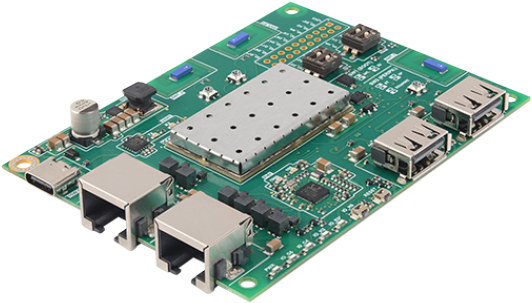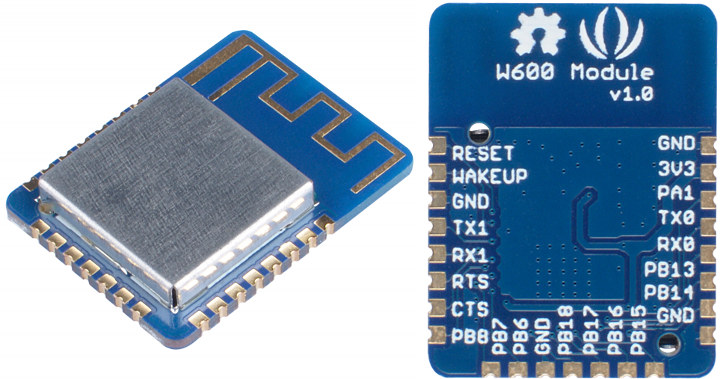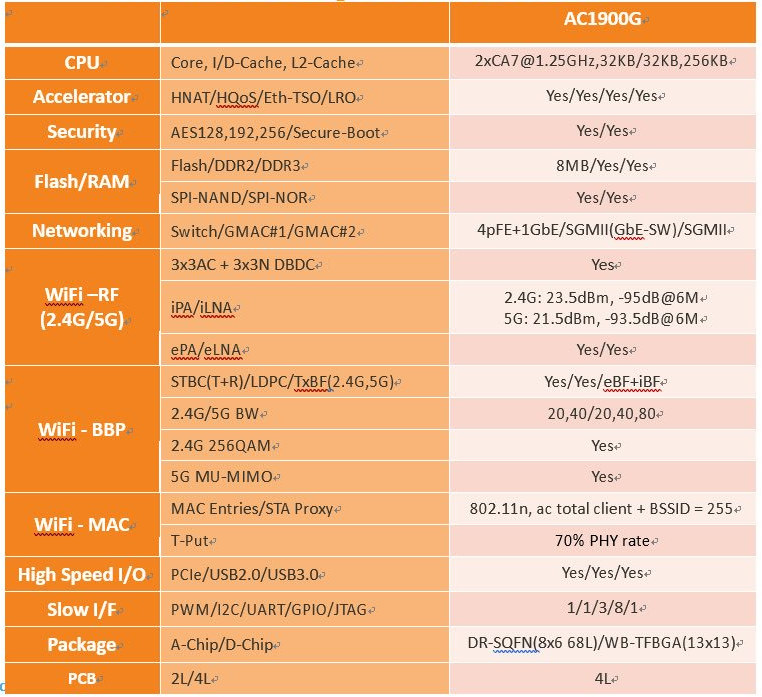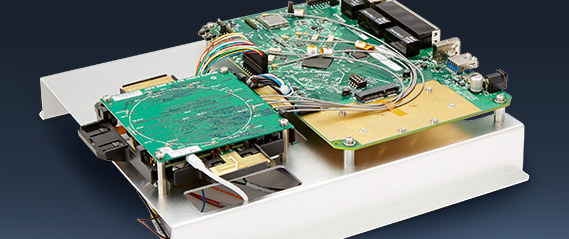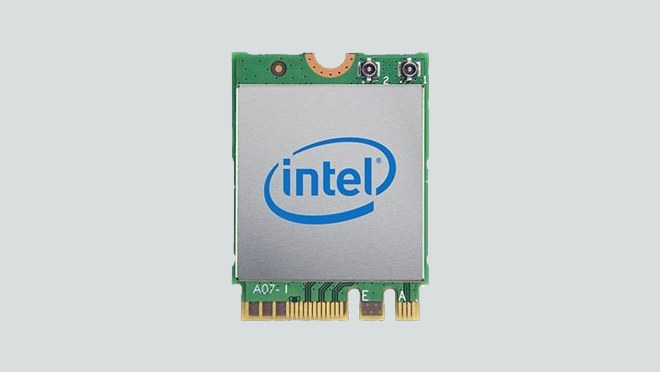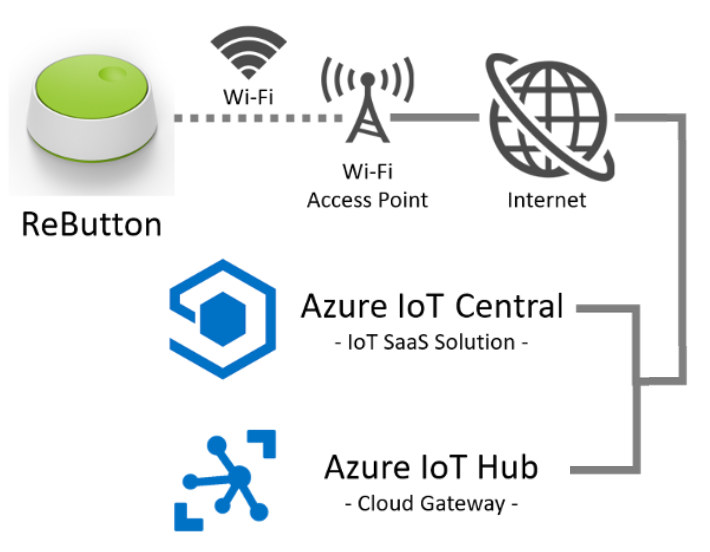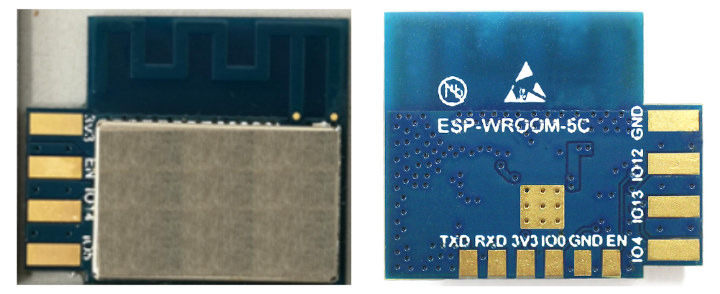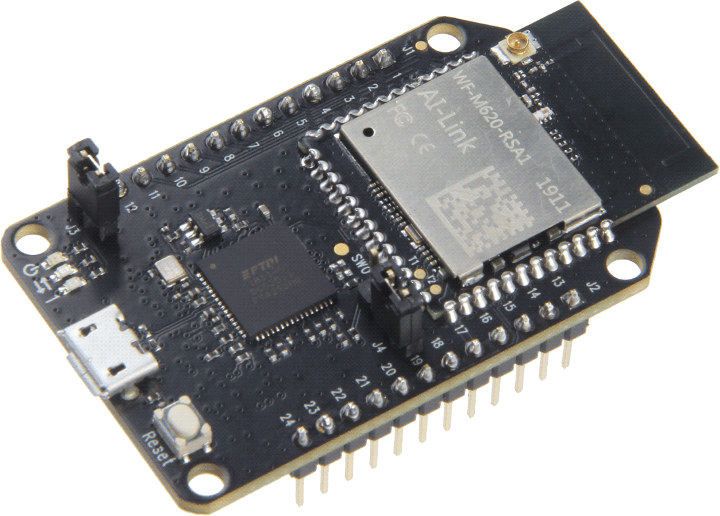8devices has been developping and selling WiFi modules such as their Rambutan Atheros module, and the now-discontinued Carambola module. The company is now back with Komikan, an 802.11ac Wave 2 + Bluetooth 4.1 module, as well as the corresponding Komikan development kit. Komikan 802.11ac Wave 2 Module Specifications: CPU – Realtek RTL8197FS MIPS 24Kc processor @ 1 GHz System Memory – 128 MB RAM Storage – 32MB flash Connectivity WiFi 4 802.11 b/g/n 2×2 MIMO via RTL8197FS WiFi 5 802.11ac Wave 2 2×2 MIMO via Realtek RTL8822BEH Bluetooth v2.1/3.0/4.1 Max output power – 22 dBm per chain Antenna – GPIO pins for external antenna Expansion via bottom pads – 44x GPIO, 2x USB, 4x UART (one for BT), RGMII, 2x SPI, PWM, MDIO, eMMC, JTAG, 2x I2S, PCM, 2x I2C, P-NAND Power supply – 3.3V, max power consumption 6W Dimensions – 37.5 x 21.3 mm The two integrated radios (2.4 […]
Seeed Studio W600 Certified WiFi Module to Support Arduino, Micropython
Last year, Seeed Studio introduced Air602 WiFi module, a competitor to ESP8266 based on Winner Micro W600 Arm Cortex-M3 microcontroller and selling for $1.90. The module was clearly optimized for cost and size since it offered only a few I/Os, and there was absolutely no mention about FCC or CE certifications. The company has now launched another W600 module, slightly larger to expose more I/Os, and pre-certified to comply with FCC and CE requirements. W600 certified WiFi module is offered standalone, or fitted to “Grove – W600” module for easy connection to Arduino boards. W600 Module Specifications: WiSoC – Winner Micro W600 Arm Cortex-M3 microcontroller with 1MB Flash, RF Transceiver, CMOS PA, BaseBand WiFi Connectivity – 802.11 b/g/n up to 150 Mbps Frequency – 2.4~2.4835 GHz Features – Wi-Fi WMM, WMM-PS, WPA/WPA2, WPS Protocols – TCP, UDP, ICMP, DHCP, DNS, HTTP Access Point and Station modes PCB antenna Expansion – […]
Mediatek MT7629 Dual Core Arm Processor to Power AC1900 Routers
MediaTek is working on a new dual core Cortex A7 processor that supports OpenWrt and targets AC1900 WiFi routers. That’s what I learned from a tweet by WidoraIoT detailing the main features of MediaTek MT7629 SoC as shown in the table below. So basically we have two Arm Cortex-A7 cores clocked @ up to 1.25 GHz, 8MB built-in? flash, HW accelerators and security/crypto engines, multiple Gigabit and Fast Ethernet interfaces, built-in support for 802.11n (WiFi 4) 3×3 MIMO and 802.11ac (WiFi 5) 3×3 MIMO, as well as various interfaces such as PCIe, USB 2.0, USB 3.0, and the usual slower I/Os like I2C, PWM and UART. A web search mostly shows code commits to Linux and U-boot, and we learn a few extra details such as MT7629 shares the same PCIe IP block as MT7622 dual core Cortex-A53 processor. It also reveals a forum post on Widora website with a […]
Qualcomm Mesh Networking DevKit Supports Amazon AVS
The Qualcomm Mesh Networking Development Kit for Amazon AVS enables integration of Amazon Alexa Voice Services into mesh Wi-Fi systems. A somewhat recent blog post on Amazon Developer website explains the devkit is the first ever Amazon-qualified reference design for a mesh WiFi system with Alexa built-in. The reference platform is based on the Qualcomm IPQ4019 SoC, includes a rectangular 4-microphone array, far-field audio processing algorithms for noise suppression, acoustic echo cancellation, wake word engine, and the AVS Device SDK. Qualcomm Mesh Networking DevKit specifications: WiSoC – Qualcomm IPQ4019 quad core Arm Cortex-A7 processor @ 717 MHz with SIMD DSP, WiFi 5; 40 nm process technology System Memory – 1GB DDR3L RAM Storage – eMMC flash and microSD card Display I/F – LCD interface Connectivity WiFi Standards: 802.11ac Wave 2, 802.11ac, 802.11p, 802.11n Bands: 2.4 GHz, 5 GHz Peak speed: 1.733 Gbps Channel Utilization: 20/40/80 MHz, 5/10/20/40 MHz MIMO Configuration: […]
Intel Launches WiFi 6 AX200 M.2 Wireless Card
WiFi 6 (aka 802.11ax) can deliver up to 10 Gbps in theory, and provides better handling of high density scenario in train stations, conferences, etc… We’ve seen it implemented in some routers and smartphones, but most laptops don’t support the new WiFi standard, so in order to solve this little issue, Intel has now launched AX200 M.2 WiFi 6 card in the M.2 2230 and M.2 1216 form-factors. Intel AX200 works in the 2.4GHz band up to 574 Mbps, and in the 5.0 GHz band up to 2.4 Gbps. The “Cyclone Peak” card works with both USB and PCIe signals, support 2×2 MU-MIMO, and also supports Bluetooth 5.0. Drivers are/will be available for Windows 10 64-bit, Google Chrome OS, and Linux via the “IWLWIFI” driver. Pricing for the cards is said to be $10 and $17, but I could not find it listed anywhere just yet. A few more details […]
ReButton WiFi Button Features MXCHIP EMW3166 Module
We’ve previously covered WiFi buttons based on ESP8266 processor, but Seeed Studio has just launched ReButton “developer device” that serves the same purpose but features STM32 based MXCHIP EMW3166 WiFi module instead, exposes one I2C grove connector, and is preloaded with sample firmware that triggers Azure IoT Central or Azure IoT Hub. ReButton hardware specifications: MCU module – MXCHIP EMW3166 module including STM32F412 Arm Cortex M4F MCU @ 100 MHz with 256KB SRAM, 1MB+2MB SPI Flash, and Cypress BCM43362 WiFi chip Input – 1x Push button Output – 1x RGB LED Extension – 1x I2C Grove connector (3.3V I/O) Debugging – 1x SWD pads, 1x UART for debugging Misc – 1x Jumper switch Power supply 2x AAA Alkaline batteries (LR03) Internal supply voltage – 3.3V Dimensions – 70 x 70 x 25mm The ReButton comes preloaded with an Arduino sketch that handle key presses and send a trigger to Azure […]
ESP-WROOM-5C is a Side-Mounted ESP8285 WiFi Module
You’d think by now we’d have enough ESP8266 or ESP8285 WiFi modules, but based on an FCC listing, we now know that Espressif Systems has been working on another ESP8285 WiFi module – ESP-WROOM-5C – designed to be side-mounted. ESP-WROOM-5C specifications: SoC – Espressif Systems ESP8285 Wi-Fi 802.11 b/g/n WiFi 4 @ 2412 MHz ~2462 MHz; Station/SoftAP/SoftAP + Station modes WPA/WPA2 security with EP/TKIP/AES encryption PCB antenna Peripheral interface I2C/IR Remote Control GPIO/PWM Operating voltage – 2.7V ~ 3.6V Operating current – Average: 80 mA Minimum current delivered by power supply – 500 mA Dimensions – 19 x 16 x 3.2 mm Temperature Range – -40°C ~ 105°C Reliability Tests – HTOL/HTSL/uHAST/TCT/ESD The module supports firmware upgrade over UART or OTA (Over-The-Air). Software development can be done with the IDF SDK for custom firmware, but “Cloud Server development” is also possible, and an Android/iOS app can be provided for user […]
MT3620 Mini Dev Board is a Cheaper Microsoft Azure Sphere Board
Announced nearly one year ago, Microsoft Azure Sphere is an ecosystem comprised of Azure MCUs with Microsoft Pluton Security System, Linux based Azure Sphere OS, and a secure cloud service called Azure Sphere Security Service. The first official Azure development board – MT3620 Development Board for Azure Sphere – was launched last year for $84.95. The kit may not have attracted a large number of developers, so there’s now a cheaper version – MT3620 Mini Dev board – going for $34.90 on Seeed Studio. Note that’s a pre-order and shipping is scheduled for May 13, 2019. MT3620 Mini dev board specifications: CPU Module – AI-Link WF-M620-RSA1 module with Mediatek MT3620AN single core Arm Cortex-A7 processor @ 500 MHz with 4MB SRAM, dual core Arm Cortex-M4F real-time core @ 200 MHz with 64KB RAM, Pluton security sub-system, and WiFi. Storage – 2x 8MB dual channel quad SPI (TBC) Connectivity – Dual band […]


